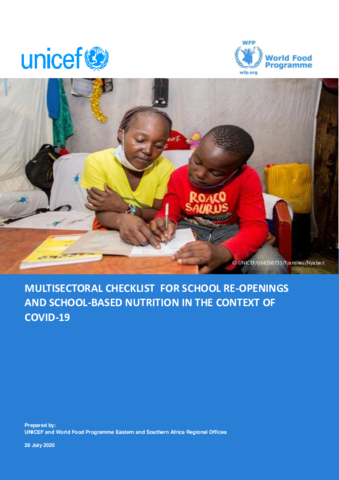
The closure of schools across the region due to the COVID-19 pandemic, has meant that large numbers of vulnerable children have been unable to access formal learning, school meals and selected nutrition and health services for extended periods. School meals provided at school contribute vital nutrients to the children’s diets, while acting as a motivation for school attendance particularly for the most marginalized and needy children. Equally important is the access to basic preventive and promotive health and nutrition services, such as the delivery of iron supplements, de-worming, and oral health and nutrition checks that are provided via the school platform. Therefore, there is an urgency for putting multi-sectoral measures in place to build back better and protect and enhance the nutrition and health outcomes of school children as they return to school.
This document has been developed by WFP and UNICEF Eastern and Southern Africa Regional Offices and provides a non-exhaustive list of recommended multi-sectoral actions for Government, UNICEF, WFP and other partners to consider as part of their short and longer-term planning for and implementation of school reopening. Part one of this checklist is focused on key nutrition actions, with part two focusing on child protection, WASH, education and health actions. The actions are divided into those that should be put in place prior to schools re-opening, and after schools have opened.
This document has been developed by WFP and UNICEF Eastern and Southern Africa Regional Offices and provides a non-exhaustive list of recommended multi-sectoral actions for Government, UNICEF, WFP and other partners to consider as part of their short and longer-term planning for and implementation of school reopening. Part one of this checklist is focused on key nutrition actions, with part two focusing on child protection, WASH, education and health actions. The actions are divided into those that should be put in place prior to schools re-opening, and after schools have opened.
